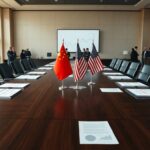Table of Contents
The recent deployment of U.S. military forces to the Caribbean has stirred up tensions between the United States and Venezuela, raising some serious questions about regional stability and the potential for conflict. Venezuelan President Nicolas Maduro is claiming that these military maneuvers are merely a thinly veiled attempt by the U.S.
to unseat his government. This is a storyline he’s been pushing throughout his presidency. So, what does this military presence really mean for both nations? Let’s dive into the implications of these developments, explore the historical context of U.S.-Venezuela relations, and discuss the potential repercussions.
Understanding the U.S. Military Deployment
The recent movements of the U.S. Navy in the Caribbean are quite notable, featuring multiple guided-missile destroyers and cruisers. Officially, these deployments are aimed at combatting drug trafficking in the region. However, Maduro frames this naval buildup as a direct threat to Venezuela’s sovereignty.
He’s been vocal about Venezuela’s readiness to defend itself against what he sees as military aggression, suggesting that the country is facing a significant challenge not seen in the past century. But is this really the case?
In response to the U.S.
military’s activities, Maduro’s administration has mobilized troops along its borders and is encouraging citizens to join militias. This strategy is a two-pronged approach: enhancing national defense while rallying public support against perceived external threats. As Maduro intensifies his rhetoric, warning of potential military intervention, he paints a picture of dire consequences not just for Venezuela but for the entire region.
But will this strategy resonate with the Venezuelan people?
The Historical Context of U.S.-Venezuela Relations
The relationship between the United States and Venezuela has been rocky for decades, marked by ideological differences and accusations of interference. The U.S.
has frequently criticized Maduro’s government for supposed ties to drug trafficking and criminal organizations—claims that some reports suggest lack substantial evidence. The aggressive approach taken by the Trump administration, which even included increasing the bounty on Maduro’s head to $50 million, has only added fuel to the fire of this complicated diplomatic relationship.
Historically, U.S. interventions in Latin America have left deep scars, and Maduro has cleverly used this history to fortify his narrative of resistance against imperialism. His administration has swung between confrontation and attempts at diplomacy, like previous discussions about immigration enforcement and the acceptance of deported Venezuelans. This back-and-forth highlights the complexities of navigating international relations in today’s polarized environment. Can any meaningful dialogue emerge from such a tumultuous backdrop?
Possible Outcomes and Regional Implications
The current military buildup could lead to several potential outcomes for both the U.S. and Venezuela. If tensions escalate, we could be looking at a direct confrontation that might destabilize not only Venezuela but the broader Caribbean region. The humanitarian implications could be significant, possibly leading to increased migration and added strain on neighboring countries. Is this a scenario we want to see unfold?
On the flip side, if diplomatic channels are properly pursued, there might be some opportunities for de-escalation. However, this would require both parties to engage in genuine dialogue and tackle the underlying issues fueling their animosity. For Maduro, maintaining a tough stance is crucial for his domestic political survival, while the U.S. needs to carefully weigh the consequences of military intervention against the broader goal of regional stability. What path will they choose?
As we keep an eye on this evolving situation, it’s essential to stay informed about developments in U.S.-Venezuela relations. The implications of military presence stretch far beyond immediate geopolitical concerns, touching on economic interests, security alliances, and the everyday lives of citizens in both nations. Are we ready to witness the unfolding of this complex narrative?





